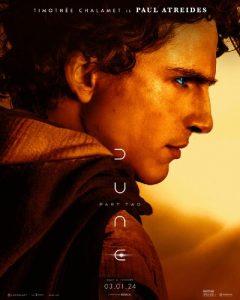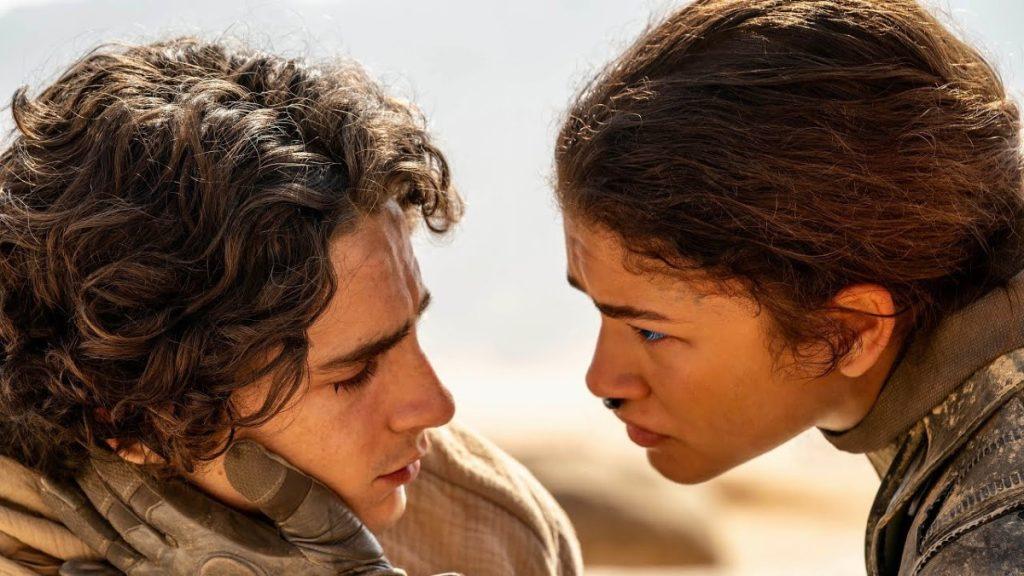
Rating: 




I hoped I would like Dune part 2. I expected to, actually. Denis Villeneuve did a good job with Dune part 1, even if it wasn’t perfect. I hoped to see the same graceful hand in the portion of the saga where things got exciting. I wanted to dwell with the characters while Paul stepped into the power he claimed at the end of part 1 and watch this dense mythology unfurl.
Which is why, upon first viewing, I was disappointed. The second movie almost forgets the end of the first. When Paul and Jessica flee into the desert at the end of part 1, he lays claim to power with Kynes and Stilgar alluding to being the Lisan al Gaib and suggesting he can become the emperor. Then he spends the whole second movie running away from that same power. Having read the book and knowing what was coming, it wasn’t interesting to watch him spend all his time denying the inevitable. If I hadn’t read the book, so didn’t know what to expect, I still would have wanted to watch him move into power; wrestle with both his innate power and the external power of the Fremen’s devotion.
From a storytelling perspective, having a character fighting to avoid something is never as interesting as them fighting to achieve something. And so many of the moves Paul and the other characters do make are boiled down to barely a scene and sometimes just a single line. We don’t see Paul strategizing with the Fremen. We don’t see him leading them through influence before he steps into actually leading them. We get one scene where the tell Stilgar he knows the Harkonnen and they should work together. That’s it. And then suddenly he is the mystic and feared Muad’Dib. Without any participation of the audience through that journey. For all the cinematic grandeur, the writing lacked tension; lacked excitement and intrigue. It felt surprisingly passive given the machinations of the story.
This is apparent in the opening, which for part 2 is a bit of world building, a bit of recap and a good dose of action. What it’s lacking is a connection to the characters. Part 2 makes the fatal mistake of borrowing on the audience’s affection for the characters and so jumps into the plot without trying to earn our connection to the characters. Gone are the moments from part 1 where we understand this world through the eyes of a mother and son, a father burdened with navigating a political trap and facing it with honor (and without the prescience of a navigator). Those relationships have crumbled in part 2 and we’re left with too few shards.

The only relationship that gets attention is Paul’s connection to Chani. Lady Jessica was an interesting force in the first movie, especially in her interactions with Paul. But she’s barely in part 2 and hardly ever with her son. We lose the tension of her goading him into the role of Mahdi and him resisting her. Instead, his struggle is more of an internal resistance, voiced to both Jessica and Chani, while Jessica does exactly what she wants with the Fremen without Paul around to interfere. The essence of the story is the same, but the dynamics between the characters is lost.
We also lose a good bit of the mythology. Villeneuve intentionally strayed away from the more fantasy elements of the story.
“There’s a level of realism I was looking for. I wanted the audience to believe in this world. I wanted to go away from fantasy as much as possible, even if it’s a fantasy world.”
Denis Villeneuve
As a result, Paul’s role as the kwisack haderack is entirely underplayed. This makes it a bit odd that he included Alia, though less odd that there is little explanation of her consciousness. It would have been simple enough to acknowledge that Jessica shouldn’t have had the water of life while pregnant and let it end at that. We don’t get any connection between the origin of spice and the ecology of the world (which has a huge impact on the idea of turning Arrakis into a paradise). And most of all we don’t get the full sense of the universal power plays Paul is making.
By under playing the kwisack haderack we don’t understand how he’s subverted the Bene Gesserit and threatened their power. By not explaining the origin of spice we don’t grasp the immensity of him taking control of Arrakis. We do get some sense of him taking political power from the Emperor but that’s the least interesting of the moves he makes.
While I understand the shift Villeneuve is making into the second film, I don’t think it served the story well.
“For the first movie, we are following Paul, who is discovering a world. It’s more meditative, more contemplative, more him in contact with the elements. And for the second one, he becomes a man, a guerrilla fighter falling in love, and wants to avenge his father, and it’s more of an action movie. We are confronted with the guerrilla warfare and the technology of the opponent. That will transform the old story and transform it into a war zone.”
On a basic film level, I still didn’t like the music. But Brian Tyler’s score for Children of Dune will probably always be my favorite version. I also didn’t like the set design, especially of the throne room at the end. It should be a big, beautiful space that radiates power. Instead it’s a little room with a chair they carry in and pretend it’s a throne. Several of the scenes are also too dark, perhaps to create contrast and perhaps to hide the lack of set design. That’s definitely not where the money went in this film.
The performances were good, given what they had to work with in a story that was all warfare with little tension because the writing wasn’t spectacular.
| Writing: |      |
| Characters: |      |
| Performances: |      |
| Directing: |      |
| Production: |      |
| Overall: |      |